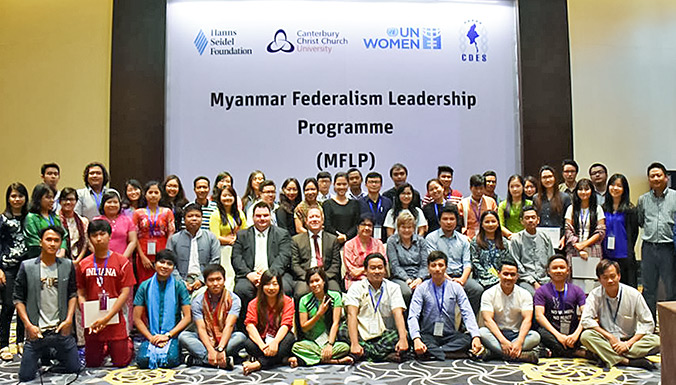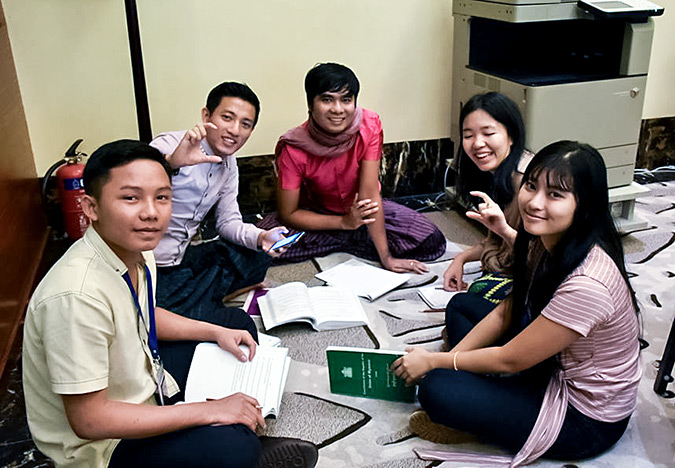Training on Federalism and Women's Rights Given to 40 Future Leaders
Date:
Nay Pyi Taw, Myanmar — Forty potential future leaders from across Myanmar have received training on the proposed federal system of government and how it can open opportunities to boost the status and participation of women in the country's affairs.

The Myanmar Federalism Leadership Programme, held here during 16-26 November, was jointly organized by Hanns Seidel Foundation (Germany), UN Women, Centre for Development and Ethnic Studies (Myanmar), and Canterbury Christ Church University in Kent, England.
For decades, armed ethnic groups have fought for greater autonomy from Myanmar's central government. The ongoing peace negotiations envision a federal system under which some degree of self-governance would devolve to the ethnic areas.
The participants in the training came from the Government and from non-governmental organizations including civil society and ethnic-based groups from almost all states and regions in Myanmar. The main trainers were Soren Keil, Associate Professor in Politics and International Relations at Canterbury Christ Church University, and Christine Forster, Associate Professor in the Law Faculty at the University of New South Wales in Sydney, Australia.

The participants discussed federalism as a political theory and as a tool in the peace process. They also discussed how different models of federal states can open the way for women to gain public offices and roles in conflict resolution and development programmes.
Professor Forster said that achieving gender equality is critical to Myanmar's future, and a new federal model creates many opportunities for positive change. These included, she said, strengthening the equality and non-discrimination provisions in the Bill of Rights in the Constitution; ensuring that resources allocated to education, health care and public services support gender equality; and increasing women's political representation, perhaps through quotas and the establishment of a Women's Ministry in the Union and state/regional governments.
Wine Sandy Myint, a freelance consultant on gender issues and one of the participants in the training, said: "As a woman who is working for gender equality and women rights, I find that federalism is an entry point to integrate gender into nation-building. Currently, the peace stakeholders are focusing on power-sharing and ethnic rights, but the rights of women must also be considered for a democratic federal Union. Women's groups should start thinking how to strategically integrate these issues in the current decision-making and negotiation processes."
Jean D'Cunha, Head of UN Women Myanmar, said that because of gender stereotypes and discrimination, Myanmar's women are affected by conflict, development and governance very differently from men.
"Women thus need to be a critical part of federal governance," she said. "Women are best able to represent their own interests, and as research shows, are more likely to bring the interests of other groups to the policy table, thus ensuring sustainable peace and development. Moreover, federal governance is a key issue for discussion in peace deliberations and it is important that women's priorities in federalism find robust reflection in these debates from their inception. The training therefore sought to create a cohort of …women and men who better understand the social, economic, political and cultural priorities of women… and strategies for negotiating women's priorities in federal governance."
Achim Munz, Resident Representative of the Hanns Seidel Foundation in Myanmar, said the workshop was longer than usual in order to allow for advanced discussions on decentralization, federalism and gender issues. "Both participants and experts were incredibly engaged and motivated during the entire 10 days," he said.
The organizers hope to hold the Myanmar Federalism Leadership Programme annually.
Media Inquiries:
Dr. Jean D'Cunha
Head of Office, UN Women Myanmar
Tel: +95 1 2305960, ext: 1582
Email: [ Click to reveal ]